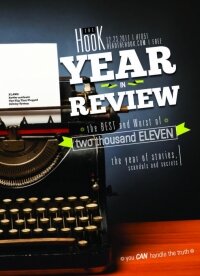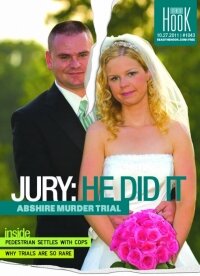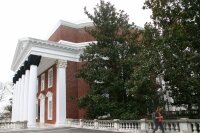Year in review: The best and worst of 2011
 December 22, 2011 Since the Hook started doing a year-in-review issue 10 years ago, we've always wanted to say that this is the best year ever: The economy is on a roll, employers are hiring as fast as they can, partisanship is passé, elected officials value compromise to make our country a better place to live, people feel optimistic about their future, and that of their kids.
December 22, 2011 Since the Hook started doing a year-in-review issue 10 years ago, we've always wanted to say that this is the best year ever: The economy is on a roll, employers are hiring as fast as they can, partisanship is passé, elected officials value compromise to make our country a better place to live, people feel optimistic about their future, and that of their kids.
Alas, that would not be 2011.
But there were some interesting rumblings. The Arab Spring and Occupy Wherever suggest an awakening and a weariness of the status quo. Whether these incidents of "I'm mad as hell and not going to take it anymore" will amount to lasting change remains to be seen. But having the masses willing to rise up peacefully is always a refreshing development.
Also good news is that the long war in Iraq is over for American troops.
Meanwhile, the uncertainty that has mired us since 2008 continues. Maybe our home values have stopped plunging quite so much, but what's going on in Greece and the European money markets makes us uneasy, as does the brinksmanship that recently put the U.S on the brink of default.
The year's natural disasters frankly were rattling. The near 9.0 earthquake in Japan was of such a magnitude that we expected the earth to start crumbling apart.
And then to have a 5.8 magnitude temblor hit Central Virginia and cause serious damage in Louisa? Followed by a hurricane and a tornado? What in heck is going on?
With 2012 looming, some believe the end of the world is near. Or it could mean the beginning of a new era. Of the latter, we want to believe. And if it's the former, well, this will be the Hook's final year in review. But before we go, the best and worst of 2011...
 Best leaked documents: An envelope delivered to the Hook late last year reveals the secret $87.7 million appraisal for Biscuit Run, the 3,100-unit growth-area development turned state park, a figure nearly double what its developers paid at the height of the real estate bubble, and which would have allowed taxpayers to bail developers out of a bad deal through tax credits. In October, lead developer Hunter Craig files a lawsuit seeking another $20 million in tax credits. Local lawmakers on both sides of the General Assembly aisle, like Dems Creigh Deeds and David Toscano, and Republicans Rob Bell and Bryce Reeves, seem remarkably resistant to demand fuller disclosure of who's getting how much of the state's $107 million in taxpayer bounty.
Best leaked documents: An envelope delivered to the Hook late last year reveals the secret $87.7 million appraisal for Biscuit Run, the 3,100-unit growth-area development turned state park, a figure nearly double what its developers paid at the height of the real estate bubble, and which would have allowed taxpayers to bail developers out of a bad deal through tax credits. In October, lead developer Hunter Craig files a lawsuit seeking another $20 million in tax credits. Local lawmakers on both sides of the General Assembly aisle, like Dems Creigh Deeds and David Toscano, and Republicans Rob Bell and Bryce Reeves, seem remarkably resistant to demand fuller disclosure of who's getting how much of the state's $107 million in taxpayer bounty.
Best other state perks for the rich: Conservation easement and historic rehabilitation tax credits encourage well-heeled citizens to protect their estates, subsidized by taxpayers. Locally, 12 property owners have reaped $3.1 million in historic tax credits the past five years, and Virginia grants over $100 million in conservation easement tax credits a year.
Biggest return from the dead: As the hour neared midnight, the Western 29 Bypass rose from the grave at a June 8 Board of Supervisors meeting, and a month later, the state okays $230 million for the controversial project– although VDOT estimates are about $200 million more than that.
Best political maneuvering: Republicans as far up the food chain as Secretary of Transportation Sean Connaughton and local supes Rodney Thomas, Duane Snow, and Ken Boyd set in motion the return of the bypass by getting a critical vote– Democrat Lindsay Dorrier's– changed, end-running decades of opposition to the wildly expensive, yet surprisingly popular road.
Least successful challenge: Democrat Cynthia Neff runs against Ken Boyd for his Rivanna District seat, citing the 29 Bypass coup, and loses with 43 percent of the vote to Boyd's 57 percent, his largest margin ever.
Ken Boyd for his Rivanna District seat, citing the 29 Bypass coup, and loses with 43 percent of the vote to Boyd's 57 percent, his largest margin ever.
Biggest change in Scottsville: Twenty-six-year-old Christopher Dumler wins the supe's seat long held by Dorrier over Republican Jim Norwood.
Biggest contretemps in Scottsville: Norwood inspired a faction of citizens who claimed unethical behavior when he served as economic development adviser for the Chamber of Commerce and then tried to buy cheap some of the restaurants whose books he'd looked over. Norwood fired back with a letter entitled "Scottsville has a Cancer" that urged a boycott of the Scottsville Weekly, which reported on the allegations, and the businesses that distribute it.
Largest number of City Council candidates: Eleven– seven Dems and four independents– line up for three seats on City Council. Kathy Galvin, Dede Smith, and incumbent Satyendra Huja win the Democratic nominations. Smith is endorsed by independent, fellow pro-dredger Bob Fenwick, but doesn't return the favor. Per usual, three Dems are elected to Council in November.
Most bizarre Council campaign: James Halfaday's run for office gets stranger after he comes in last in the August primary. Following the August 23 quake, he posts photos of himself in a neck collar and claims he was injured from a falling ceiling, which would make him the only reported Charlottesville casualty. That story prompts a lawyer to reveal that Halfaday is not an owner of Snap Fitness gym as he'd claimed throughout his campaign. The Hook discovers that Halfaday may not even live in the city, at least according to the people who live in the Sunset Road address he used to file, and a reporter finds that three people listed on campaign filings as having donated $499 to his campaign flatly deny contributing. On October 19, he's charged with four felony counts of election fraud for the false address. The case goes to court in late January.
 But wait, there's more: Halfaday also claims he's in fear for his life from a volunteer for an opponent's campaign and takes out an emergency protective order, for which the woman is arrested. Those charges are thrown out of court November 7.
But wait, there's more: Halfaday also claims he's in fear for his life from a volunteer for an opponent's campaign and takes out an emergency protective order, for which the woman is arrested. Those charges are thrown out of court November 7.
Most heated clerk of court race: Public defender/school board member Llezelle Dugger challenges Charlottesville incumbent Paul Garrett when he decides to seek a fourth eight-year term for the $112K-a-year job, and handily defeats him in the Democratic firehouse primary in August, then steamrolls Dem-turned-independent Pam Melampy in November.
Best news for pro-dammers: City Council's David Brown, Satyendra Huja, and Kristin Szakos vote for a controversial mega dam at Ragged Mountain Reservoir in January. By December, bids are in for a 30-foot earthen dam.
 Best second act: Patricia Kluge ended 2010 with her winery in the hands of creditors, and sees foreclosure auctions early this year of her mansion, Albemarle House, her Vineyard Estates subdivision, the spec house where she currently resides in Vineyard Estates, and her former gastro-gas station, Fuel Co., followed by a filing for bankruptcy. Yet by October, Kluge is back running– if not owning– her winery, thanks to old pal Donald Trump, at a grand opening of Trump Vineyard Estates that celebrated her resilience.
Best second act: Patricia Kluge ended 2010 with her winery in the hands of creditors, and sees foreclosure auctions early this year of her mansion, Albemarle House, her Vineyard Estates subdivision, the spec house where she currently resides in Vineyard Estates, and her former gastro-gas station, Fuel Co., followed by a filing for bankruptcy. Yet by October, Kluge is back running– if not owning– her winery, thanks to old pal Donald Trump, at a grand opening of Trump Vineyard Estates that celebrated her resilience.
Biggest auction: Trump scores Kluge Estate Winery at an April 7 absolute auction for $6.2 million, far less than Farm Credit had hoped to bring against the $35 million it lent Kluge. Even splitting the 901-acre winery into six parcels only raised $7.3 million.
Best art of the deal: The Donald's low-ball bid to buy Albemarle House was not accepted by the bank, but he owns the front yard and posts it with no-trespassing signs, making a manor house listed for $16 million less attractive for a potential buyer. Trump claims a right of first refusal on the Albemarle House property. Bank of America files suit in hopes of disabusing him of that notion.
Biggest foreclosures (besides Kluge's): Upper Bundoran, built by the Scott family and now on a preservation development called Bundoran Farm, is auctioned April 18. The owner, Edge Valley Preservation LLC, insists the project is solid, but by June 29, Wells Fargo is the only bidder on the courthouse steps and reclaims the property for $7.5 million.
Biggest openings: UVA dedicates the 150,000-square-foot Emily Couric Cancer Center in February. And it cuts the ribbon on its smart new engineering facility, the $65 million Rice Hall, November 19. And Martha Jefferson Hospital moves to its new digs on Pantops in August.
Biggest renovation: CFA Institute, which oversees financial professionals, announces it's moving into the old Martha Jefferson hospital, bringing jobs and property tax payments, and an innovative waste treatment system called the Living Machine when it relocates in spring 2013.
 Most long-awaited renovation: The long-shuttered Jefferson School finally gets a $12-million loan to turn the historic African-American learning center into a nonprofit community center, and a September 14 celebration kicks off the work.
Most long-awaited renovation: The long-shuttered Jefferson School finally gets a $12-million loan to turn the historic African-American learning center into a nonprofit community center, and a September 14 celebration kicks off the work.
Oldest Downtown Mall skeleton: A whole generation may grow thinking the Landmark hotel is a Charlottesville landmark.
Major Minor activities: Halsey Minor sees a foreclosure of his Colonial Williamsburg manse, and forestalls it by placing the LLC that owns it into bankruptcy. His L.A. attorney begs off representing Minor, citing an unpaid $5 million tab, and Minor files an affidavit of indigence in a Georgia court. Most recently, a Charlottesville judge puts the city's $128K tax bill as the first priority for the assets of Minor Family Hotels LLC to cover.
Biggest name changes: The Charlottesville Pavilion becomes nTelos Wireless Pavilion in April when the telecom purchases the naming rights from Coran Capshaw. Wachovia becomes Wells Fargo in August.
 Most painful construction project: The JPA bridge closes in April for a replacement project that will take 18 months, inconveniencing Fry's Spring residents and severely traumatizing local businesses such as the legendary Wayside Chicken.
Most painful construction project: The JPA bridge closes in April for a replacement project that will take 18 months, inconveniencing Fry's Spring residents and severely traumatizing local businesses such as the legendary Wayside Chicken.
Most annoying temporary fix: Rather than patch the deteriorating sidewalk on the Belmont Bridge, the city opts to put up a $15,000 fence on the east side to block pedestrian access.
Most like your mom, part 1: Charlottesville enacts a law requiring bike riders under 14 to wear helmets. Critics point to research helmets can dig in at impact and increase the risk of paralysis.
Most like your mom, part 2: A School Health Advisory Board calls for trimming sugar in city school lunches, citing the abundance of obesity among children.
Most surprising issue: Albmarle County, at the prodding of the Jefferson Area Tea Party and with the support of Supe Ken Boyd, pulls out of the International Council for Local Environmental Initiatives and Cool Counties– arguing that under the guise of sustainability, the programs allow the United Nations and federal government to pull the strings in local matters.
Most new parks: Albemarle opens two equestrian-friendly parks in the nether reaches of the county– Preddy Creek Trails in May, and Patricia Ann Byrom Forest Preserve Park in August.
Most vicious vandalism: Ruffians attack Van der Linde Recycling over Memorial Day weekend, gouging holes in the gas tanks, radiators, and hydraulic lines of all 26 company vehicles.
 Most bittersweet anniversary: The Shenandoah National Park celebrates its 75th birthday, and descendants of those who lived in what's now the park recall how shabbily some of those residents were treated, stereotyped as slack-jawed yokels and forced off their land.
Most bittersweet anniversary: The Shenandoah National Park celebrates its 75th birthday, and descendants of those who lived in what's now the park recall how shabbily some of those residents were treated, stereotyped as slack-jawed yokels and forced off their land.
Most America-altering anniversary: September 11, 2011, marks 10 years since the 21st-century attack that will go down in infamy.
Most disturbing anniversary: January 2011 marks a year since the body of Morgan Harrington, the 20-year-old who disappeared from a Metallica concert at John Paul Jones Arena, was discovered in a remote field at Anchorage Farm. With the second anniversary looming, her killer has not been arrested. Her parents launch a campaign, Save the Next Girl, and on the two-year anniversary of her disappearance, file suit against the RMC Events, the company that provided security at the October 17, 2009, JPJ concert where Morgan was not allowed to return inside.
Newest tool in unsolved murders: At the behest of Harrington's parents, in March Governor Bob McDonnell okays the use of familial DNA– a process that seeks a close match to genetic evidence in hopes that family members' DNA will home in on a suspect.
 Quickest jury verdict: After a week-long trial, Eric Abshire is convicted on October 25 in fewer than two hours of killing his wife, Justine Swartz Abshire, five years ago and then staging a shoddy hit-and-run– with a potential $1.5 million insurance payout at stake.
Quickest jury verdict: After a week-long trial, Eric Abshire is convicted on October 25 in fewer than two hours of killing his wife, Justine Swartz Abshire, five years ago and then staging a shoddy hit-and-run– with a potential $1.5 million insurance payout at stake.
Biggest upcoming murder trial: Former UVA student and lacrosse player George Huguely V has been in jail since the morning of May 3, 2010, after the battered body of his former girlfriend, Yeardley Love, is found in her 14th Street apartment. Huguely has not been seen outside of jail in a year and a half, but is expected to attend his first-degree murder trial that starts February 6.
Worst attempt to get back into the dating scene: Jeffrey Kitze, who served 20 years for the 1989 rape and brutal beating of his sister's roommate the day after the young women graduated from UVA Law School, is found guilty of stalking a woman at a volunteer group called Foods not Bombs, January 10. Kitze appeals, but is jailed for a parole violation.
Worst casualties of forbidden love: An affair between Kimberly Crilley, 48, and a 14-year-old boy resulted in her husband shooting the teen when he tried to force his way into their Mt. Solon home. The boy's leg had to be amputated, and he faces charges for the home invasion, but in November, is ordered to have a mental exam after disruptive behavior in court. Kimberly Crilley is sentenced to three years for felonious carnal knowledge and contributing to the delinquency of a minor.
Worst dog shooting: Mattie, a 10-month-old Siberian Husky, is killed in her fenced front yard. Justin Tyler Riggs, 26, and Brian Charles Tichner, 21, are arrested and convicted of the slaying.
Worst triple slaying: Charlottesville residents Dustin Tyler Knighton, 25, Brian Robert Lee Daniels, 26, and Lisa Hwang, 26, are murdered May 3 in Greene County. Taybronne Altereik White is charged.
Worst child porn case: Horrific child rape videos are allegedly found on files belonging to Willis E. Coley, 26, of Alexandria. While in the Albemarle Charlottesville Regional Jail awaiting a federal indictment, Coley kills himself August 2.
Worst groping: Caitlin Mahoney was walking out of Club 216 when she she says felt a man's hand up under her skirt. Antoine Rashard Anderson is charged with felonious attempted object penetration, and Mahoney thinks he got off too lightly with a misdemeanor sexual battery conviction May 31. He's sentenced to eight months.
Worst hazing: A Zeta Psi pledge is hospitalized in March after imbibing soy sauce, and UVA bans the Rugby Road fraternity for two years.
Worst frat fall: The railing on a Pi Kappa Alpha porch collapses September 24 and two men are taken to UVA Medical Center, one with a serious head injury.
Worst fall: Thomas W. Gilliam IV, 19, slips off the roof of the Physics Building at UVA March 27 and dies, tragically illustrating the dangers in the tradition of accessing forbidden spaces at the university.
 Biggest changing of the guard: UVA women's basketball coach Debbie Ryan abruptly steps down in March after 34 years leading the Lady Cavs and a dismal 5-9 season. Joanne Boyle from Berkeley takes over as head coach.
Biggest changing of the guard: UVA women's basketball coach Debbie Ryan abruptly steps down in March after 34 years leading the Lady Cavs and a dismal 5-9 season. Joanne Boyle from Berkeley takes over as head coach.
Biggest change in policy: After a string of high-profile female victims, on May 6, UVA overhauls its sexual assault policy, and changes evidentiary standards from "clear and convincing evidence" to "a preponderance of the evidence," in assessing crimes against students.
Biggest change in law that doesn't entirely pass: Kathryn's Law, named in honor of UVA rape victim Kathryn Russell, originially called for rape and murder investigations to be turned over to local police departments rather than be handled by campus police. The version recommended by the Virginia Crime Commission calls for "voluntary" aid between police departments, and doesn't include the part that campus police notify the commonwealth's attorney of all felonies. The bill will go to a full vote in the 2012 legislative session.
Latest VQR news: Following the tragic suicide of Kevin Morrissey in 2010 and the public pillorying of the venerable Virginia Quarterly Review's editor, Ted Genoways, with accusations of workplace bullying, 2011 finds the periodical still winning awards, albeit with a smaller-than-ever circulation of fewer than 1,200 subscribers. The tragedy inspires a documentary called Our Bully Pulpit: What Really Killed Kevin Morrissey? Genoways gets in more hot water offering to share a recording of an employee conversation with the Washington Post, but by December, two national heavyweights– Jon Parrish Peede and Donovan Webster– are hired as publisher and deputy editor, respectively.
Biggest move to the major leagues: Hook co-owner/Pennisula Capital founder Ted Weschler gets the nod from Warren Buffett to invest for Berkshire Hathaway.
Biggest buying frenzy: Groupon enters the lexicon and a social media discount buying craze sweeps the nation. The Hook joins in with its Daily Deal, and by the end of the year, we're all wondering what to do with all those unused coupons.
Toniest neighborhood blaze: High winds fan a smoldering burn pile and scorch 600 acres in and around Ragged Mountain Farms February 19, taking out a barn, but no homes. Developer Alex Toomy is charged with two misdemeanor counts in the accidental wildfire, and is acquitted May 31.
Worst home invasion: Eileen Aiken discovers there's little legal protection when her neighbors' cigarette smoke seeps into her upstairs condo at Hessian Hills, a former apartment complex turned condo, and she can't afford to sue.
Most flammable: A spate of car fires– three in two days– ignites early in the year, including a driver's ed car ablaze while refueling at the Albemarle County Office Building and a Yellow Cab in flames at Region Ten.
Most former mayors in court: Accused client-throttler Frank Buck reaches a civil settlement March 3 and criminal charges are dropped. Blake Caravati is accused of spousal assault September 9 and ordered to have counseling and good behavior for nine months October 21, after which the charge may be dismissed.
Most disturbing aftermath of a double slaying: When the body of Nola Charles and her three-year old son were found in their charred Cling Lane residence in Crozet in 2003, the community reeled. Four teens were arrested for the murders and three went to prison. One of those, Rocky Fugett, has recanted his story fingering Robert Davis and now says Davis had nothing to do with the murders– and that another person was involved who was never charged. Davis, 27, who made what his lawyer insists is a false confession, has been in prison since 2003. A special prosecutor is appointed in July, but so far, Davis is still locked up.
Worst state if you're innocent and in prison: The zeal to lock up criminals in Virginia is not matched by an enthusiasm for releasing those incarcerated who are innocent. Earl Washingon Jr. spent 18 years in prison and was within days of execution before DNA evidence cleared him. Even when DNA seemingly exonerated four sailors known as the Norfolk Four, then Governor Tim Kaine refused an unconditional pardon. Just this month, Thomas Haynesworth was cleared after 27 years in prison, an exoneration pushed by Attorney General Ken Cuccinelli. For those where DNA evidence is not available, like Robert Davis, the prospect for freedom is far more grim.
Worst reason to send a SWAT team: Approximately 10 flak-jacketed, automatic-weapons-toting, search-warrantless agents swarm the property where Philip Cobbs, 53, lives and takes care of his 90-year-old mother July 26 after a buzzing helicopter reports allegedly sights reefer. The agents find two pot plants, and a month later charge Cobbs with possession of marijuana. He's found guilty in Albemarle General District Court October 18, despite his testimony that he didn't know the plants were there, and is appealing the charges.
 Worst other assaults on the Fourth Amendment: Disorderly conduct charges are dropped in short order January 10 against Charlottesville native Aaron Tobey for writing the amendment about protection from unreasonable searches on his chest and stripping off his shirt while going through security December 30 at Richmond International Airport. Represented by the Rutherford Institute, Tobey files a lawsuit in March, and in August is allowed to proceed against the TSA agents, but not the agency itself.
Worst other assaults on the Fourth Amendment: Disorderly conduct charges are dropped in short order January 10 against Charlottesville native Aaron Tobey for writing the amendment about protection from unreasonable searches on his chest and stripping off his shirt while going through security December 30 at Richmond International Airport. Represented by the Rutherford Institute, Tobey files a lawsuit in March, and in August is allowed to proceed against the TSA agents, but not the agency itself.
Quickest to ignore the Fourth Amendment: When two female students accuse a third of drinking at school, Western Albemarle administrators haul in the student for a police-administered breathalyzer, without contacting the girl's parents, as called for in the school's student conduct handbook. The test found no trace of alcohol.
Most interesting constitutional challenge: Attorney Jeff Fogel files a lawsuit in June on behalf of downtown panhandlers, claiming the city's restrictions on where begging can occur violates the First and Fourteenth amendments.
Least clear understanding of the First Amendment and public property: Chris Walters was protesting Dominion Virginia Power's mountaintop removal practices at its May 12 shareholders meeting at the Boar's Head Inn when an Albemarle police officer tells him he has to leave the side of U.S. 250 because it's private property. Walters refuses and is arrested for trespassing. He's found not guilty in July.
Biggest assault on the press: Following a September 12 editorial in which the Cavalier Daily reveals a plagiarist, the paper's managing board is hit with conduct charges for allegedly violating Honor Code confidentiality, even though the copier wasn't identified. Charges are dropped against four of the Cav Daily 5, and editor-in-chief Jason Ally goes to the University Judiciary Committee October 18, which decides it doesn't have jurisdiction.
Biggest book banning: In August, the Albemarle School Board boots Arthur Conan Doyle's A Study in Scarlet from sixth grade reading lists after a parent complains about its depictions of Mormons and despite a petition with 200 student signatures in favor of keeping the Holmesian volume.
 Biggest software flop: Albemarle schools invest over $2 million in a problem-plagued program called Schoolnet that is denounced by teachers and that created errors in student transcripts.
Biggest software flop: Albemarle schools invest over $2 million in a problem-plagued program called Schoolnet that is denounced by teachers and that created errors in student transcripts.
Biggest FOIA bill: The Hook is charged nearly $2,000 to fill its Freedom of Information Act request about Schoolnet, but Albemarle exempts 268 emails to and from Superintendent Pam Moran about the software.
Biggest lawsuit: Scottsville resident Barb Tocci sues UVA Medical Center for $50 million, claiming an emergency room visit left her permanently disabled.
Biggest measles outbreak: In May, a student at the Waldorf School is among four locals who contract the once-rare disease with 40 exposed students considered at risk because they hadn't received the vaccinations.
Most notorious UVA law students: Shortly before graduation, Johnathan Perkins writes an article in the student paper claiming two University Police officers had harassed him because he was black, and then admits he made the story up. Daniel Watkins is arrested May 6 for stalking and assault, but those charges are dropped in August. And second-year Joshua Peter Gomes is arrested in the wee hours of December 7 outside Carruthers Hall, and charged with two counts of B&E and one of possession of burglary tools. In December, a barrister-in-training pleads guilty to disorderly conduct for alleged instance of road rage.
Worst morning-after surprise: When a 40-something citizen goes to Kmart to buy Plan B after a contraception malfunction, pharmacist Kevin Wright refuses to sell the over-the-counter product to her, calling himself a "conscientious objector."
Messiest wrongful death suit: The $10.6 million award for the death of Jessica Scott Lester when an Allied Concrete truck overturned onto her car in 2007 is slashed by Judge Edward Hogshire, who cuts her husband's award nearly in half and sanctions Isaiah Lester, and his attorney, Matt Murray, more than $700,000 for tampering with evidence. Juror Margaret Gardiner objects to Hogshire's reduction of the award, which he calls "excessive" and "motivated by bias, sympathy, passion or prejudice." Both sides appeal.
Freakiest thunderstorm: Severe weather August 14 takes down the canopy of the Goco station on Cherry Avenue.
 Latest trend in local publishing: Two papers featuring mugshots arrive. Crime Times launches June 1, and Media General follows up with Gotcha in October.
Latest trend in local publishing: Two papers featuring mugshots arrive. Crime Times launches June 1, and Media General follows up with Gotcha in October.
Worst week for natural disasters: The 5.8 magnitude Cuckoo quake hits August 23, wreaking havoc in Louisa. A couple of days later, Hurricane Irene heads up the coast.
Worst continuing assault on Louisa: A tornado roars through October 13.
Most public divorce: Therapist Howard Vidaver is accused of sleeping with multiple female patients over 15 years in papers filed by his wife, Laurie Vidaver. The state licensing board previously had disciplined him for the same behavior.
Most missing spouses: Fluvanna resident Robert Lee Hourihan, 33, is last seen by his family April 8, and his car is found three weeks later in Maryland. A Charlottesville woman, Kelly Porterfield, claims she was abducted June 23 when she's found near an overlook in Blowing Rock, North Carolina, and investigators question her story.
Least successful murder for hire: Linda Faye McDaniel, 62, arrested April 16 on attempted murder for hire and arson charges for trying to bump off her husband's girlfriend, enters an Alford plea in August.
Most fatalities: Albemarle sees five traffic deaths in less than a week in November: Jane McKay, 76, drives off Scottsville Road November 8 and dies a week later; on November 10, Amber Leigh Johnson, 20, and her father, Michael Johnson, 40, die when a car driven by Amber's mother, Jessica Lewis slams into a tree on Half Mile Branch Road in Crozet (Lewis is charged with two counts of involuntary manslaughter); Larry L. Taylor, 59, dies the next morning on I-64 when a Honda Civic driven by Samuel A. Wells slams into him (Wells is charged with reckless driving), and on November 16, 24-year-old Amy Ouypron headed south on Scottsville Road crashes into a northbound SUV and dies at the scene. The county's death toll is 19 so far this year, the highest since 2003.
Most common factors in traffic deaths: Speed, seatbelts, and alcohol. None of those dying in November were wearing seatbelts.
Biggest burning ban: Pre-quake inspections reveal cracks in UVA Lawn fireplaces, so cozy evenings in front of a fire are forbidden.
 Biggest tree-hugging petition: News that hundred-year-old magnolias crowding out the Rotunda need to be removed for roof repair incites 3,000 people to ask UVA to spare the axe.
Biggest tree-hugging petition: News that hundred-year-old magnolias crowding out the Rotunda need to be removed for roof repair incites 3,000 people to ask UVA to spare the axe.
Biggest bombshell in the Gerry Mitchell lawsuit: A lawsuit shows that Albemarle cop Gregory C. Davis was texting his girlfriend when he ran into Mitchell's wheelchair in a West Main crosswalk in 2007. The case against the county is settled for an undisclosed amount in October, two months before Mitchell dies December 7.
Most redlight runners: The cameras at U.S.29 and Rio Road generate 7,638 tickets between December 11, 2010, and July 31, 2011, although 3,200 of those are tossed before the summons go out.
 Best place to occupy: Charlottesville City Council bends over backwards to allow protestors to camp out in Lee Park in October for more than a month. By Thanksgiving, the welcome has worn thin, and the city declines to make an indefinite campground there. Most occupiers have pulled up tent stakes by the 11pm November 30 curfew, but 18 are arrested or cited.
Best place to occupy: Charlottesville City Council bends over backwards to allow protestors to camp out in Lee Park in October for more than a month. By Thanksgiving, the welcome has worn thin, and the city declines to make an indefinite campground there. Most occupiers have pulled up tent stakes by the 11pm November 30 curfew, but 18 are arrested or cited.
Most memorable characters from the Occupy scene: Thanks for the memories, Bearded Lady and Naked Lady.

2 comments
Any particular reason you name and link to stories of the three of four law students you reported on this year who don't have a guilty verdict associated with them, but do not call out by name nor link to your article on the fourth one who actually does?
Good collection. Thanks.